Supreme Leader's Daily Calls Two-State Solution ‘Treason’
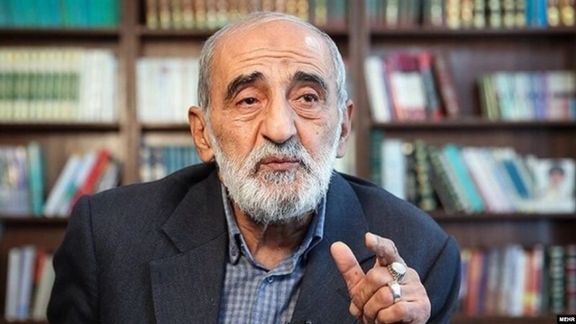
The firebrand Hossein Shariatmadari, the editor of the flagship Khamenei-funded hardliner newspaper Kayhan, decried talk of a two state solution in the Palestine-Israel conflict.

The firebrand Hossein Shariatmadari, the editor of the flagship Khamenei-funded hardliner newspaper Kayhan, decried talk of a two state solution in the Palestine-Israel conflict.
In a rare moment in which a regime representative speaks of Israel in its internationally accepted name, rather than 'the Zionist entity' as is standard, he said: "The only solution is to eliminate Israel from the face of the earth and from the world map."
He also said anyone supporting such a solution to the Middle East's most intangible conflict, was committing "treason and complicity in Israel's crime".
The provocative stance from Kayhan comes in the wake of Iran's recent acceptance of the two-state solution, a move that appears to have irked the ultraconservative elements in the country.
Last week, an ultraconservative lawmaker initiated impeachment proceedings against Foreign Minister Hossein Amir-Abdollahian, accusing him of "weakness in playing a central and effective role" in addressing the Gaza conflict. The war has become the most bitter conflict between Israel and Iran-backed Hamas since the designated terror group took control of the strip in 2007 following a Hamas invasion on October 7 in which 1,200 mostly civilians were murdered and around 240 more were kidnapped to Gaza.
Mahmoud Abbaszadeh-Meshkini, a member of the Parliament’s National Security and Foreign Policy Committee, questioned the shift in discourse, stating, "How is it that until recently, the goal was to eliminate the Zionist regime, but now the discourse has shifted."
The two-state solution proposes an independent Palestinian state alongside Israel, aiming to address the long-standing Israeli-Palestinian conflict. However, disputes over borders persist, particularly regarding Israel's withdrawal from territories occupied in 1967, a demand rejected by Israel.
Iran has traditionally maintained a public position advocating for the annihilation of Israel as a state, rejecting any two-state agreement. Despite this, on October 27, the UN General Assembly passed a resolution calling for a "humanitarian truce" in Gaza, which Iran voted in favor of.
While hardliners within the Iranian regime continue to call for the destruction of Israel and express eagerness to engage in the Gaza conflict, the top leadership has been cautious, avoiding direct involvement in spite of its funding Hamas over $100 million a year and supporting it with military aid.
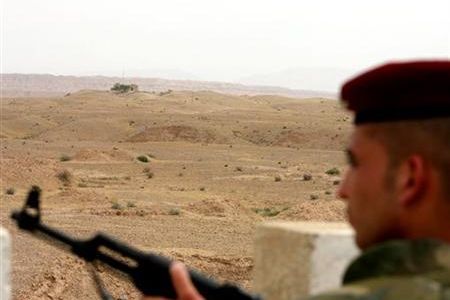
The Commander of the Iraqi Border Patrol has finished the construction of over 100 observation towers along the borders of the Kurdistan Region of Iraq with Iran.
According to a statement from the Iraqi Border Patrol, the measure is part of the security agreement between Baghdad and Tehran to protect the borders against security threats and smuggling.
Back in March, during a ceremony attended by Prime Minister Mohammed Shia' Al Sudani in Baghdad, then-Secretary of Iran’s Supreme National Security Council (SNSC), Ali Shamkhani, and his Iraqi counterpart al-Araji signed a joint security cooperation document aimed at curtailing the activities of Iranian-Kurdish militants.
The Islamic Republic had previously threatened to take action if the Kurdish groups do not move their forces away from the Iranian borders in the Kurdistan Region of Iraq.
On September 19, Iraq announced that it had complied with the terms of the joint security pact with Iran and disarmed the opposition groups on the border.
Late in September, Iraqi border guards built “a 200-kilometer-long security barrier and installed more than 150 thermal cameras within the border with Iran,” state media reported, citing an interior ministry official.
Tehran has long accused the Kurdistan Regional Government (KRG) of harboring opposition groups labeled as "terrorist" or "anti-revolutionary" and permitting them to use border areas as launchpads for attacks against Iran. The groups claim that their armed campaign aims to "defend the rights of the Kurds" in Iran.
During the nationwide uprising against the Islamic Republic following the government's killing of Mahsa Amini, the Revolutionary Guard repeatedly targeted Kurdish positions.
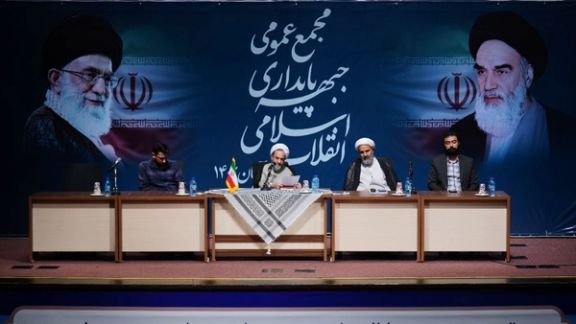
Morteza Aqa-Tehrani, a leader of Iran’s hardliner Paydari party, holding the majority in the parliament (Majles), demands more seats in the next election in March.
The party held its general assembly at a mosque in Tehran this week where Aqa-Tehrani asserted that Paydari is not seeking to monopolize power. This is a claim many politicians in Iran would readily dispute based on the party's actions in the past few months. Many politicians in the inner circles of the ruling elite have argued that Paydari is behind the political "purification" project which aims to purge the Iranian political landscape, to ensure monopoly on power by ultraconservatives.
Paydari is also one of the main contestants in the upcoming parliamentary elections and despite Aqa-Tehrani's claim of not seeking dominance, it is fiercely fighting other groups to win the lion's share of parliamentary seats. This behavior has even annoyed an insider in Khamenei’s inner circle, former Majles Speaker Gholam Ali Haddad Adel, who accused Paydari of "radicalism".
According to Khabar Online website, Aqa-Tehrani, who is currently the head of the Cultural Committee of the Majles and has been the driving force behind the law to restrict Iranians' access to social media and the Internet in general, said at the party's general assembly that the party takes pride in promoting the restrictions. He argued that "Islam has certain rules for better utilization of social media," while Islamic precepts were formed hundreds of years ago.
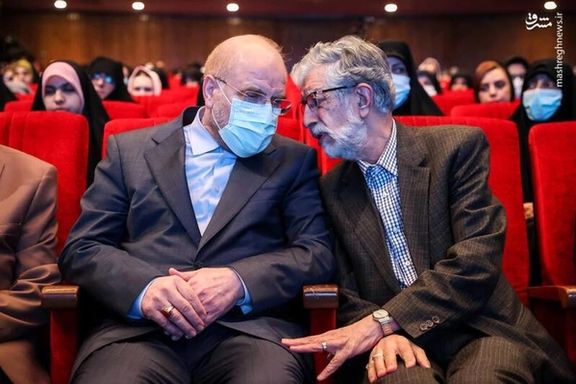
He also said that his party has been behind the law to criminalize and ban abortion. He further claimed credit for helping the government in circumventing US sanctions. Although he did not present any evidence other than saying that he took part in an inter-parliamentary meeting in Africa, yet it is widely known in Iran that "circumventing sanctions" could mean money laundering and financial corruption, sometimes through acting as private companies that sell Iran's oil at a discount in unofficial markets.
Quoting the founding father of Paydari, the late Ayatollah Mohammad Taqi Mesbah Yazdi, the cleric said: "Mesbah made it clear upon that Paydari Party’s fundamental principle should be Velayah (rule by the Supreme Leader). He went further by quoting ayatollah Mesbah as having said that “People should be absolutely obedient to the Supreme Leader."
A video exists on social media showing Ayatollah Mesbah trying to kiss Khamenei's feet before a meeting as a token of his absolute obedience. Khamenei, however, prevented him from doing so.
Mesbah said many times during the past decades that the Supreme Leader is appointed by God, not appointed, or elected by the people. Aqa-Tehrani said: "Based on that, we should see what the Supreme Leader wants and then we should obey him and defend him against seditionists.
This can be a hint as to why Khamenei facilitated Paydari’s success in the 2020 parliamentary elections by allowing his loyalists in the Guardian Council to disqualify many other candidates.
Reports say that Mesbah Yazdi's son, Mojtaba, was also present at Paydari Party's meeting and offered guidelines to party leaders and members. Khabar Online website in Tehran wrote with a latent sarcasm that "Mojtaba followed the footsteps of his father." He said any intelligent movement needs a roadmap, a leader and a guide. Ayatollah Ruhollah Khomeini offered the roadmap for the Islamic revolution and Supreme Leader Ali Khamenei is leading it.
Reformist commentator Sadeq Zibakalam commented that as a result of the disqualification of non-conservative candidates and political purification, even fewer Iranians will vote in the upcoming election in March 2024 than the previous election which set an all-time record in low turnout in Iran.
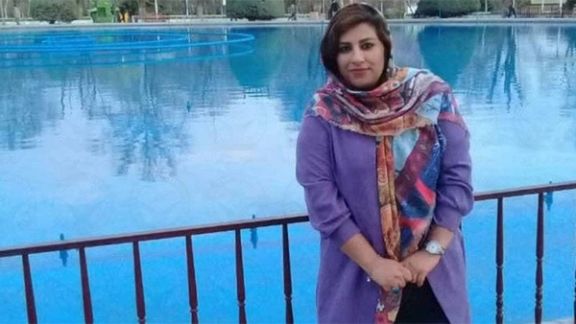
Political prisoner Mahboubeh Rezaei, has reacted to her 26-year jail term in Evin Prison under charges of undermining national security with a vow to continue her activism.
Following her sentencing, she said: "Whether in prison or outside, I will continue my path alongside the Iranian people, and I will not cease my efforts until the freedom of our homeland."
Last week, peaceful activists Rezaei, Samaneh Norouz Moradi and Reza Mohammad Hosseini, were collectively sentenced to a total of 61 years and 10 months by Branch 28 of the Revolutionary Court in Tehran. Their charges included "membership in opposition groups aiming to undermine national security."
The issued verdict states that if the sentence is confirmed in the appeals court, the enforceable part would be 7 years and 9 months for Mahboubeh Rezaei and Reza Mohammad Hosseini, and 6 years and 3 months for Samaneh Norouz Moradi.
In her letter, the political prisoner proudly announced, "Although my youth is spent in prison, I am not disheartened. Love for our homeland has rendered the prison's anxieties meaningless and has kept hope alive more than ever. In Evin Prison, I will be alongside other sisters and brothers who are fighters for freedom."
Mahboubeh Rezaei was first detained in May 2017 and was released from Adelabad Prison of Shiraz in June 2022. During her previous incarceration, she was exiled to Bushehr Prison, south of Iran and later returned to Shiraz after nine months.
In 2021, while in Bushehr Prison, she spoke about the assault on female prisoners in an audio message, and a few days later, her phone access was temporarily cut off.
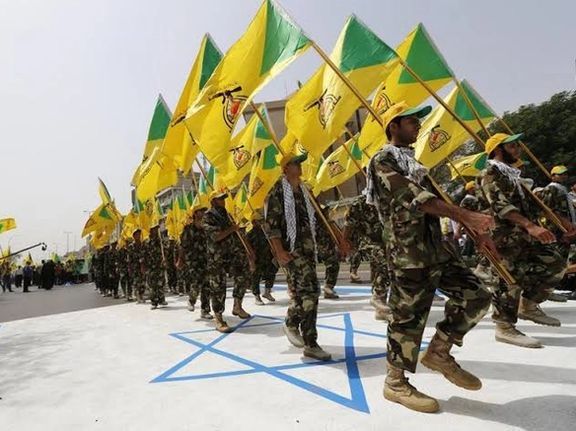
Iran-backed Iraqi militia dismissed US sanctions a day after it was announced by the Biden administration, calling it “ridiculous”.
Kataeb Hezbollah (KH) has been responsible for many of the thirty-odd attacks on American troops in Iraq since last month.
In a statement published online Saturday, the group said, “well-studied strikes by the Islamic Resistance in Iraq against enemies, causing losses in their ranks and destroying vehicles or confusing or distracting them, is going according to a strategy to drain the enemy".
Iran proxies have been targeting American forces ever since Israel invaded Gaza in retaliation for Hamas terror attack of 7 October. They say the attacks will continue as long as the United States supports the Israeli onslaught on Gaza.
On Friday, the Biden administration sanctioned six people because of their affiliation with KH. Among those targeted is a member of the IRGC Quds Force, who is said to be in charge of travel and training for KH forces in Iran.
It’s not clear if the newly introduced sanctions can have a meaningful impact. The regime in Iran and its proxies have been operating largely under such restrictions for a long time.
Biden critics accuse him of “appeasing” Iran, which they say has emboldened the regime and its proxies in the region. The US has so far launched four airstrikes in Syria and Iraq, in responses to 62 drone and missile attacks in the opposite direction.
“Iran is not deterred, their proxies are not deterred,” former White House national security advisor Robert O’brien said Friday in an interview with Politico. “We’re not doing enough to protect our troops … more needs to be done.”
Criticism of the Biden administration grew once more this week after it issued a sanction waiver that allows Iraq to pay Iran the money it owes for imported electricity –up to $10 billion, reportedly.
“Iranian proxies have attacked U.S. forces 58 times since October 17. Instead of responding to these attacks swiftly and decisively, Biden released $10 billion in new funds to Iran. Money is fungible, appeasement is dangerous, and our troops deserve better,” posted Congressman Guy Reschenthaler on X.
At least 59 US military personnel have been wounded in attacks by Iran-backed groups in Iraq and Syria, according to Pentagon officials.
The United States has 900 troops in Syria, and 2,500 more in neighboring Iraq.
On Saturday, the commander of the IRGC warned US and Israel that they will lose the war against the “invisible” Palestinians, who “target Israeli tanks from point blank” in what he called “a war of attrition.”
General Hossein Salami said, “the US can’t save Israel from falling apart, because the US usually turns up to save Zionists when it’s too late.”
In the past few weeks, the US has deployed warships and air defense systems to the region, amid concerns that Israel’s onslaught of Gaza could trigger other groups such as Hezbollah in Lebanon to officially enter the scene, putting the whole region ablaze and endangering American troops stationed across the Middle East.
Earlier this year, KH abducted Russian-Israeli researcher Elizabeth Tsurkov and last week released a video of her in the first signs of life since her kidnap in March. Studying a PhD at Princeton, her family in the US claim that the US should be doing more to secure her release, given the billions of aid annually given to Iraq, including for its army.

Iranians are expressing outrage on social media over the renaming of two beloved pre-Islamic festivals, viewed as an attempt to erode "ancient Iranian culture."
This week, Iranian media reported that the Supreme Council of Cultural Revolution (SCCR) has chosen to rename certain events on the official calendar of the Islamic Republic, including the festivals of Yalda and Charshanbeh Souri, both of which predate the Islamization of Iran in the 6th century AD.
The Supreme Council of Cultural Revolution, comprising several appointees of Supreme Leader Ali Khamenei, is tasked with neutralizing external cultural influences and ideologies, particularly Western, and ensuring that education and culture align with Islamic values.
Social media users vow to celebrate the two festivals "with even more splendor" in defiance of the regime. They have also shared numerous jokes about the lengthy and irrelevant new names assigned to their cherished festivals.
They have also highlighted the regime's past attempts to erase the country's history by renaming numerous streets, buildings, and even cities and provinces, like Shahi and Kermanshah, often due to their association with the monarchy and the deposed royal family. However, most people have persisted in using the old names until now.

"At the end of the day, we will still call these occasions Yalda night and Charshanbeh Souri. Are they going to install CCTV and bring in their plainclothesmen to our homes to make sure we are not doing so?" one of the many tweets about the renaming of festivals said, reflecting the sentiment surrounding the renaming of the festivals.
For over four decades since the early years of the Islamic Revolution, the religious establishment and Islamic revolutionaries have opposed the celebration of ancient festivals, including Nowruz (Persian New Year). Instead, they have sought to substitute them with Islamic calendar events such as Eid al-Fitr, Eid ul-Adha, Mab’ath (the beginning of the Prophet Muhammad’s mission), and the birthdays of the Prophet and Shiite Imams.
Most Iranians, even many religious families, however, have not forsaken their beloved ancient festivals and continue to celebrate them alongside religious occasions.
The first of the two festivals renamed by the Council, Yalda, also known as Chelleh Night, traditionally takes place on the longest and darkest night of the year.
This Winter Solstice festival has been observed by Iranian peoples and others in the region since ancient times. People come together at home to enjoy special foods, play music, read poetry, tell fortunes, and engage in various customs that vary across regions.
The SCCR has now renamed the day as the "Day of Promotion of the Culture of Hosting and Connecting with Relatives."
The second festival, Charshanbeh Souri, celebrated on the evening of the last Tuesday of the year just before the Nowruz holiday on March 21, involves similar customs of food, music, fortune-telling, poetry recitation, and the distinctive tradition of lighting small bonfires on the streets and jumping over them.
The hardliner religious establishment, in particular, strongly disapproves of the practice of lighting fires during Charshanbeh Souri. To them, this act evokes memories of the pre-Islamic religion of Iran, Zoroastrianism, where the lighting and tending of fire played a significant role in worship rituals. They view this association with fire as a form of paganism and consider it as "worshipping of fire."
The Council has decided to rename Charshanbeh Souri as “Day of Honouring Neighbors”.
Sizdah-be-dar, celebrated on the 13th day of the Persian calendar (April 1/2), is another ancient festival with uncertain origins cherished and observed by most Iranians, despite disapproval from the religious establishment. This festival, during which everyone leaves their homes to picnic in the open air, was renamed "Nature Day" years ago.
The public's reaction to the renaming of the two festivals was so strong that the Council's spokesman, Abbas Mirza Hosseini, had to deny the removal of the names of ancient festivals from the official calendar. He claimed that the new names were only complementary and emphasized the "national identity and Islamic-Iranian culture and civilization."